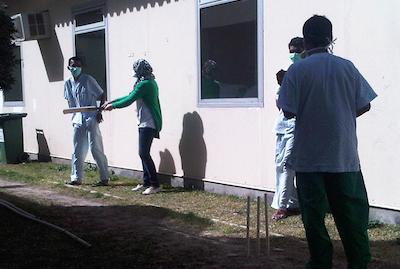Students Work to Tackle TB Incidence in Qatar
April, 2011

Marwa Saleh engages patients in a game of cricket at HMC's TB Clinic.
According to World Health Organization statistics, tuberculosis (TB) incidence in Qatar is among the lowest worldwide. Yet, this figure does not reflect the status of migrant workers in the country. With the support of a Qatar National Research Fund Undergraduate Research Experience Program grant, students at WCMC-Q are working with Hamad Medical Corporation to explore the perceptions and experiences of infected workers and promote health care and prevention along these lines.
“Because TB is usually a disease of the poor and unfortunate, it’s important for students to be involved not only as a health care exercise, but as a chance to reflect on economic factors and the stress of the situation,” said Dr. Abdul Latif Al Khal, head of the communicable disease unit at HMC and National TB Program manager. “We need to consider the living conditions beyond the disease itself, and this is one of these situations where reaching out to the community will address the whole issue.”
The two main aims of the student study, overseen by Autumn Watts, MFA, a writing lecturer at WCMC-Q, involve spending time with the workers who are patients at HMC’s TB clinic in order to write narratives about their experience, and surveying the wider community of migrant workers about their perceptions of TB in order to target factors that might delay their treatment.
“We are trying to gauge how long workers go undetected,” said second-year medical student Marwa Saleh, who is one of four student researchers involved in the study. “This can be for cultural reasons or for not understanding the disease.”
Saleh said that the experience in the clinic can vary greatly for each worker. Some can suffer great stress due to a guilt they feel at not sending money to their families in their country of origin, and this can impact whether or not they would encourage others to report the disease at all.
“The sensitive economic complexities of their employment here means that the repercussions of TB extend beyond physical health, and can impact the migrant worker's entire life and their family's lives,” Watts said. “In this case, narratives can be critically important for understanding the patient's perspective and experiences of their own disease, and we aim to provide a safe space for workers to tell their stories. We believe these stories will help health and outreach staff better understand the populations they are trying to help.”
In addition to the students involved in the research project— second-year medical students Maryam Ayaz, Abhyudaya Joshi, Rahima Sanya and Saleh—members of the WCMC-Q student Global Health Club are working in an outreach capacity to help educate and uplift those in the clinic. They have so far supplied the clinic with games and activities and are working to teach the patients to be leaders in their communities, to educate other workers about TB and the risks.
“We played charades and games with them,” Saleh, who is a founding member of the Global Health Club, said. “We were all laughing and the response by those on the outskirts was ‘what is that laughter … where is that coming from?’ … the sound of that much laughter was new to them.”
The students are working with faculty at WCMC-Q and the staff at the Communicable Disease Clinic to start English-teaching modules at the clinic as well as other educational programs for the workers while they are inpatients.
“It’s not the easiest disease to deal with,” Al Khal Said. “The students have shown a lot of interest and it’s really great of them, it’s encouraging to see this.”
“This project exemplifies the heart of UREP in that it's entirely student driven,” Watts said. “Marwa approached me about her ideas for this project two years ago, and then independently conducted her own pilot study in the TB isolation clinic.
“This is an essentially humanitarian and holistic project, and I think further social outreach is a natural extension of that,” Watts concluded.
By Emily Alp
